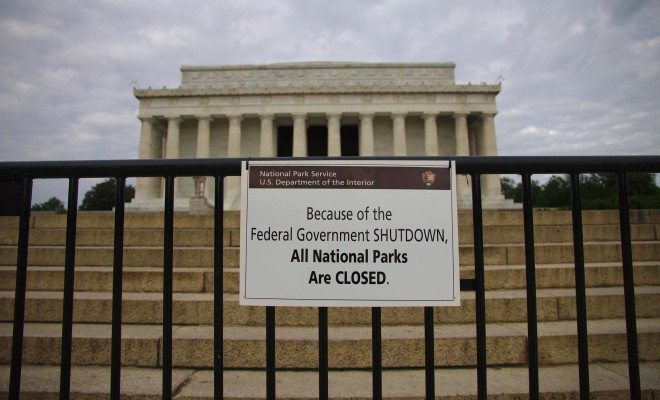 Image courtesy of [Rich Renomeron via Flickr]
Image courtesy of [Rich Renomeron via Flickr]
News
Brace Yourselves: A Government Shutdown May Be Looming
As Congress returns to Washington there are several important issues on the docket, from the Iran deal to Pope Francis’ speech, but there is one major debate that is sure to take center stage in the coming days: budget negotiations. It’s certainly not everyone’s favorite reminder of Fall, but it comes each year as sure as the change in seasons. This time around, the budget debate is shaping up to be a particularly ugly battle and may even lead to yet another government shutdown.
Creating a budget traditionally involves the passage of 12 different bills, which fund various parts of the government. But in recent years, Congress has had difficulty passing budget measures and has resorted to using continuing resolutions, which essentially maintain existing funding levels for a short period of time to extend negotiations. The last time Congress passed all 12 bills on time (before the fiscal year begins on October 1) was back in 1996.
When Congress does pass a budget, it typically takes the form of an omnibus bill that combines all of the various spending measures into one piece of legislation. However, such bills often include a lot of minor amendments that allow congressmen to sneak in controversial policies. These changes manage to get through because they are attached to such an important bill, which few people want to derail over one specific issue. A recent example of this was the so-called “Cromnibus” bill, a continuing resolution that was passed at the 11th hour (almost literally) before an impending shutdown last December. The bill included some contentious elements, like raising limits for donations to political parties and rolling back some of the regulations passed after the 2008 financial crisis.
This year, there are several major hurdles that Congress must get past in order to agree on a new budget, which makes a shutdown all the more likely. For those of you who remember the 2013 shutdown–which sought to push back the implementation of Obamacare and lasted for 16 days–a familiar face is back at the center of attention: Senator and Presidential candidate Ted Cruz. Cruz is leading an emerging group of conservative Republicans who want to stop federal funding for Planned Parenthood–the non-profit healthcare organization that provides a range of reproductive health services including, controversially, abortions. Planned Parenthood receives more than $500 million annually; however, due to a decades-old amendment, that funding cannot be used for abortions.
While Planned Parenthood is perennially a hot topic in American politics, it has become the subject of a lot of attention lately after a series of videos were released alleging that the organization sold organs and tissue from aborted fetuses to researchers. The videos were released by an anti-abortion group called the Center for Medical Progress. So far, state investigations into Planned Parenthood have found no evidence of wrongdoing and a review of the videos indicate that they were edited before publishing.
There are currently 28 Republicans in the House and Senator Cruz in the Senate who have stated their commitment to either defunding Planned Parenthood or forcing a government shutdown. If the movement garners enough support, the group could refuse to vote on any spending measure that includes any funding for Planned Parenthood. Even if Congress manages to pass a budget that defunds the organization, it will still likely lead to a shutdown because President Obama has already vowed to veto any such bill. Cruz and his allies’ proposed alternative to Planned Parenthood funding calls for the money to be given to community health centers. While several Republicans favor defunding Planned Parenthood, few may be willing to shut down the government over the issue–putting many, particularly the party leaders, in a very difficult position. If the government does shut down it is likely that Congress will take the blame. After the 2013 shutdown, approval of Republicans in Congress reached an all-time low, and now that the party controls both the House and the Senate a shutdown could be even more embarrassing.
Based on the way the budget talks are developing, it’s clear that Planned Parenthood will be one of, if not the most, important issues as the deadline comes closer, but its funding won’t be the only controversial topic in budget talks. Due to the Budget Control Act passed in 2011, also known as the sequester, caps were placed on both domestic and military spending. President Obama has harshly criticized the caps for domestic spending and many Republicans want to provide additional military spending after the Pentagon’s budget faced dramatic cuts as sequestration began. Republicans are now trying to move funding from domestic programs as a way to increase military spending, but President Obama and Congressional Democrats will likely reject any compromise that does not include raising domestic spending. The President has promised to veto any bill that leaves sequestration-level budget caps in place.
Congress only has just over 10 legislative days to pass a new budget or a continuing resolution before the government shuts down at midnight on September 30. Some experts. like Stan Collender, have given precise estimates–Collender believes there is a 67 percent chance of a shutdown. Overall, the likelihood of either solution seems to be in doubt as the deadline looms closer, leaving budget analysts to argue that a shutdown is more likely than not.








Comments